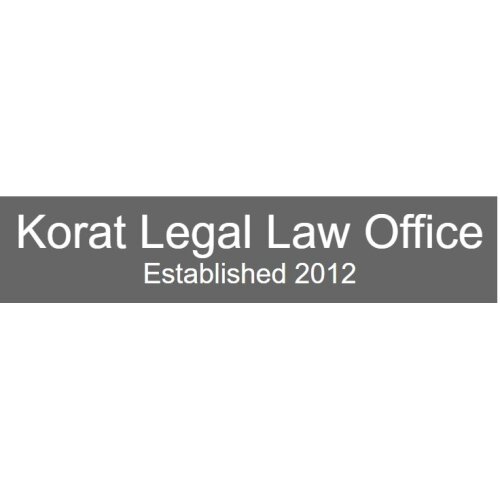Best Foreclosure Lawyers in Nakhon Ratchasima
Share your needs with us, get contacted by law firms.
Free. Takes 2 min.
Free Guide to Hiring a Real Estate Lawyer
List of the best lawyers in Nakhon Ratchasima, Thailand
About Foreclosure Law in Nakhon Ratchasima, Thailand
Foreclosure in Nakhon Ratchasima, Thailand, is a legal process through which a lender attempts to recover the balance of a loan from a borrower who has stopped making payments, by forcing the sale of the asset used as the collateral for the loan, typically a property. The process is governed by Thai civil and commercial law, which regulates financial obligations, creditor rights, and the procedures that must be followed by creditors and debtors. In Nakhon Ratchasima, as in other parts of Thailand, foreclosure can be a complex process, often necessitating legal assistance to navigate effectively.
Why You May Need a Lawyer
There are several situations where you may require legal help in the context of foreclosure:
- Understanding Your Rights and Obligations: Whether you are a borrower facing foreclosure or a creditor initiating it, understanding your legal rights and obligations is crucial.
- Negotiation and Settlement: Lawyers can help negotiate better terms with creditors or develop repayment plans to prevent foreclosure.
- Foreclosure Defense: An attorney can assist in challenging foreclosure proceedings if there are legal grounds to do so.
- Legal Representation in Court: Legal representation is often vital if the foreclosure case goes to trial.
- Complex Documentation: Legal procedures in foreclosure involve complex documentation that requires expert handling.
Local Laws Overview
The foreclosure laws in Nakhon Ratchasima are heavily influenced by Thailand's broader civil and commercial codes. Key aspects include:
- Civil and Commercial Code: This code outlines the legal framework for mortgage agreements and the rights of creditors in foreclosure cases.
- Legal Procedures: The process of foreclosure involves several legal steps, including filing claims in the local court, which can be intricate.
- Property Auction: In the case of foreclosure, properties are typically sold at public auction, which requires adherence to specific legal protocols.
- Consumer Protection: Certain consumer protection laws may protect homeowners from arbitrary foreclosure practices.
Frequently Asked Questions
What is the first step in the foreclosure process?
The first step usually involves the lender sending a formal notice of default to the borrower, indicating that payments have been missed and foreclosure proceedings may commence.
Can I stop a foreclosure once it has started?
Yes, foreclosure can sometimes be halted through negotiations with the lender, by paying off the overdue amount, or through legal interventions, depending on the circumstances.
How long does the foreclosure process take in Nakhon Ratchasima?
The duration of the foreclosure process can vary but typically takes several months to a year, depending on the complexities involved and the cooperation between parties.
Are there alternatives to foreclosure?
Yes, alternatives may include loan modifications, refinancing, short sales, or repayment plans, which can be negotiated with the lender to avoid foreclosure.
What happens to my home if a foreclosure is completed?
The home is typically sold at a public auction. If the auction does not cover the full debt owed, the borrower may still be responsible for the difference.
Can I remain in my home during the foreclosure process?
Yes, homeowners typically have the right to stay in their home until the completion of the legal process, including the auction sale.
What should I do if I receive a foreclosure notice?
It is advisable to contact a lawyer immediately to understand your options and to potentially negotiate with your lender.
What fees are associated with foreclosure?
Fees may include legal costs, administrative fees, and potential late charges imposed by the lender. These can add up significantly over time.
How is the sale price determined at a foreclosure auction?
The sale price is generally determined by the auction process. However, there can be a minimum bid set to cover the lender’s expenses and debt.
Is it possible to buy my home back after a foreclosure sale?
It might be possible through a process known as 'rehabilitation,' but this typically requires meeting specific legal and financial conditions.
Additional Resources
For those seeking legal advice on foreclosure, the following resources may prove helpful:
- Legal Aid Centers: Legal aid organizations offer free services to those who qualify; local centers or community legal services might provide assistance.
- Nakhon Ratchasima Provincial Office: This governmental body can offer guidelines and information regarding property and foreclosure laws.
- Professional Legal Firms: Engaging with local legal firms experienced in property law can offer valuable support.
- Thai Bar Association: This organization can help locate registered lawyers experienced in foreclosure cases.
Next Steps
If you need legal assistance with foreclosure, consider the following steps:
- Consult a Lawyer: Reach out to a lawyer familiar with foreclosure who can provide tailored advice based on your situation.
- Gather Documentation: Compile all relevant documents, including loan agreements, correspondence with lenders, and any court notices.
- Explore Negotiation Options: Consider discussing possible solutions with your lender, like loan modifications or repayment plans.
- Stay Informed: Educate yourself about your rights and obligations under Thai law regarding foreclosure.
- Act Promptly: Time is critical, so address any foreclosure issue immediately to protect your interests.
Lawzana helps you find the best lawyers and law firms in Nakhon Ratchasima through a curated and pre-screened list of qualified legal professionals. Our platform offers rankings and detailed profiles of attorneys and law firms, allowing you to compare based on practice areas, including Foreclosure, experience, and client feedback.
Each profile includes a description of the firm's areas of practice, client reviews, team members and partners, year of establishment, spoken languages, office locations, contact information, social media presence, and any published articles or resources. Most firms on our platform speak English and are experienced in both local and international legal matters.
Get a quote from top-rated law firms in Nakhon Ratchasima, Thailand — quickly, securely, and without unnecessary hassle.
Disclaimer:
The information provided on this page is for general informational purposes only and does not constitute legal advice. While we strive to ensure the accuracy and relevance of the content, legal information may change over time, and interpretations of the law can vary. You should always consult with a qualified legal professional for advice specific to your situation.
We disclaim all liability for actions taken or not taken based on the content of this page. If you believe any information is incorrect or outdated, please contact us, and we will review and update it where appropriate.









